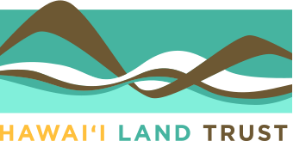Kilo as Practiced by our ʻĀina Stewards
When COVID-19 mandates began, there was a bit of hesitation on what we would be able to do as stewards and educators of Kāhili. With so much uncertainty, it was difficult to discern the how to move forward. The HILT team decided we should Kilo our public preserves. Kilo has many meanings depending on context, however in this case it means to observe and to watch closely. As I and my colleagues turned our eyes to Kāhili, our kilo provided the path to move forward.
The practice of kilo, deeply rooted in kanaka ‘ōiwi culture, is in one way, about acknowledging the environment around you -- to see a place as a living and breathing space that is not unlike ourselves. Contrary to Western style of scientific observation, kilo does not start with a hypothesis or a list of questions. Kilo starts with sitting quietly, being patient, and letting the information come to you on its own terms. In the traditional ‘ōiwi way of learning, if you ask too many questions then you aren’t really listening. By sitting and watching, all the answers to the questions in the back of our minds will already have become apparent.
Not only is kilo a way to develop a relationship to place but it is also a way to become self aware. We use our observations to make decisions and to learn. Kilo informs decisions like when to go fishing, what fish to put back and how many to take. When we stop observing we disregard the well being of a place and people, inherently disregarding a sustainable future.
There are many ‘ōiwi families that have passed on the tradition of kilo and have developed relationships with the places they were born, and the places their ancestors were born, tracing back to the beginning of time.
I have only been practicing this tradition through the lens of my ancestors for a short while so what I am writing only scratches the surface and doesn’t entirely encompass what kilo is and how important it is in ‘ōiwi culture. However, an important thing I learned early on, is that when we kilo we are also given a responsibility to take care of those observations, to use that knowledge to do what is right and to take care of the places we kilo. During this time of uncertainty and upheaval, perhaps if we all took time to kilo the places that we hold dear, the answers to a better future might just reveal themselves to us.
-Kaninau Villanueva
